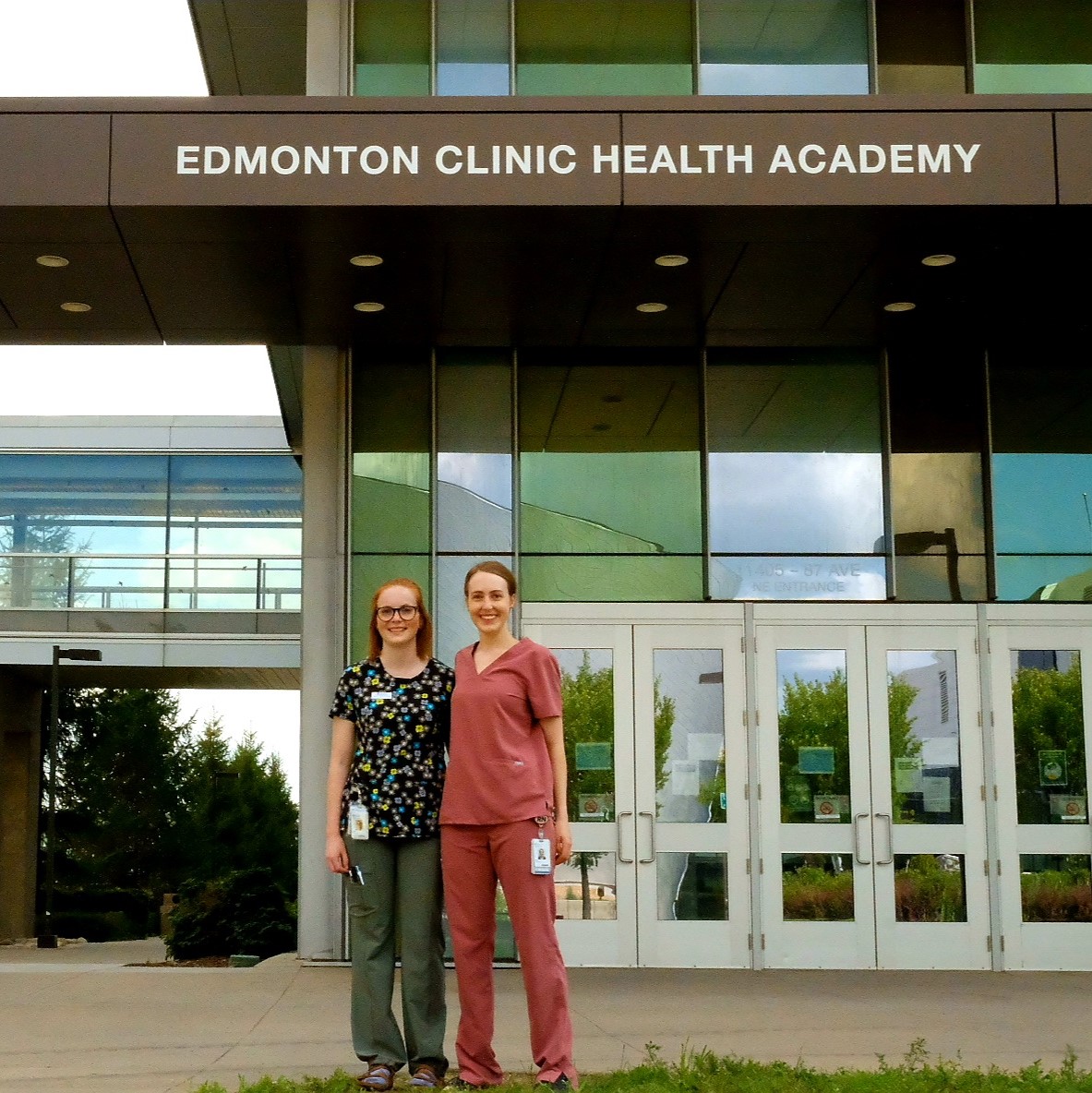Growing your own in rural nursing
Allie Voisin - 6 August 2020

Hailey Wales (left) with her nursing preceptor, Caitlin Renema (right). Photo supplied.
Hailey Wales, BScN ‘20, is no stranger to rural settings. Raised in Coronation, Alberta, a small town in East Central Alberta, she knew choosing the town of Whitecourt for her final preceptorship would give her the opportunity to give back to rural communities.
Wales — who currently works as a casual RN at the University of Alberta Hospital and at her hometown hospital — feels confident that the diverse set of skills and experience gained through her rural preceptorship has prepared her to work in a larger rural healthcare centre where she can provide a broad scope of care.
“Out of all my clinical placements throughout university, my final preceptorship was by far my favourite. Not only did I learn an immense amount of information and gain many valuable skills, but it was the placement where I felt the most supported,” explained Wales.
Nursing in a rural setting requires a widened scope of practice, with nurses working as generalists rather than experts in a particular field. Although this can be daunting for student nurses, the close-knit environment and interprofessional collaboration ensure student nurses evolving into rural Registered Nurses (RN’s) are set up for success.
Caitlin Renema, BScN ‘18, can attest to this — as a Faculty of Nursing alumna she’s gone full circle by completing her preceptorship in a rural community and is now giving back by being a preceptor to nursing students in Whitecourt, Alberta.
“I felt honoured to have the opportunity to pass on the knowledge that I gained through the University to a student of the same school. It was a way to say thank you for everything I learned, and it provided a sense of closure for that phase of my life. I feel like I can officially call myself a nurse now!” exclaimed Renema, who currently works in acute care, labour and delivery and emergency and was one of Wales preceptors.
Renema’s mentorship ensured that Wales felt supported both professionally and personally over the course of her placement. She was inspired to work with someone that was in her shoes only two years prior, and to see the great wealth of knowledge and capabilities Renema acquired over such a short period of time.
The overwhelming level of support Wales received was not only from her nursing team but from other healthcare professionals — physicians, pharmacy, laboratory and radiology to name a few — rooting for her success.
“Although I only had two specific preceptors I was assigned to work with, everyone kind of took me on as a student. Regardless of the profession, each individual was willing to teach me, voluntarily showed me new things, and never hesitated to help me out or answer any of my questions. This demonstration of compassion and involvement was consistent in how all of the staff interacted with each other and their patients,” said Wales.
Prior to Wales preceptorship, Faculty of Nursing Executive Director for Clinical Partnerships, Dr. Deirdre Jackman, organized a tour of Shock Trauma Air Rescue Service (STARS) Edmonton under the guidance of Flight Nurse and Faculty of Nursing Clinical Instructor Deb Bowers.
STARS plays a critical role in rural communities, one of the reasons Wales has always held a special interest in the vital organization.
“Growing up in a small rural community located three hours from both Edmonton and Calgary, I cannot thank STARS enough,” she said. “With a population of just over 900, our community has very limited resources and facilities, making STARS heavily relied upon when there are emergencies. STARS has not only saved many people in my community's life, but also my brothers.”
Since rural communities do not have the same access to resources as tertiary care centers, Bowers — who has worked as a Flight Nurse with STARS for 24 years — says STARS is a “valuable resource that can assist in bringing expertise to patients, or bringing the patients to a higher level of care.” Bowers attributes the teamwork between STARS crews and rural communities as one of the most rewarding aspects of her job.
Although Bowers, Renema and Wales are all in different stages of their nursing careers, they all agree rural nursing is an underrated specialty that is tremendously challenging and incredibly rewarding.
“As a nursing student a lot of your success is based on the environment you are put in. In my opinion, a rural setting is optimal to set you up for success,” states Wales. “The increased connection, teamwork, and trust present in the rural setting promotes job satisfaction and improves health care delivery.”